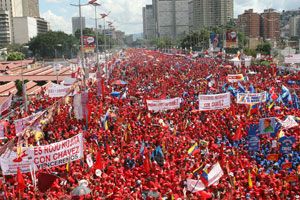
Bruno Lima Rocha – after the approve of the Amendment
I must start the article clarifying that I do write the original text from Caracas. This trip I have made for job reasons and without invitation or any expenses paid by local government. This is the first one of a four articles series on the political situation in Venezuela. This one, debates the situation prior to the referendum of February 15.
Currently the country passed through the referendum campaign, for or against the draft Constitutional Amendment of Articles 160, 162, 174, 192 and 230 (read the full text in Spanish). The essence of the proposal is simple. If approved (as it was), all the positions of political representation and Venezuelan representatives may be present for re-election as many times as they want. Thus, both legislators (local, state and national) as mayors, governors and the president may try to win the vote to stay in office without any barrier.
Exposed the issue, the arguments I have seen and heard here are all subterfuges. The Venezuelan political opposition, heading the right wing, does say that the victory of the Amendment will require the indefinite reelection of Hugo Chávez. This is not true, because someone presenting for reelection does not guarantee victory early. Already the YES alliance says that the choice for staying in power is a matter of popular sovereignty. It is also something for disagree, since people always pick up the options offered. I see the two arguments as evasive because the background is another issue.
The representative democracy in Venezuela (when was called a 4th Republic) appears with the Pact of Punto Fijo, signed in 1958 after the defeat of Perez Jiménez dictatorship. In this period, three great parties, AD, Copei and URD agree with the crop rotation to State Power and share the same vision economical-partner. The income distribution is the worst, the country does not plant what it consumes and the cities grow on outskirts hoods. To get worse, out of the supporting political system, the social protest was illegal and there was political repression, including dissident murders. The fact is that from the election of Chávez in 1998 until now, many aspects have completely changed. It is important to expose some data: in ten years the illiteracy was eradicated; the number of students of all the series increased from less than 3 millions for 11 millions; the total of college students increased six times; the health and the public transport are universal, before they were not; the per capita income increased; and the extreme poverty lessened.
The subject in list and they spin the popular perception on the other side. There is a real improvement of the quality of life of the poor Venezuelan. This is familiar through the sum of resources of the State with the promotion of the civil society of low income. The majority, while tasting being the political protagonists, does not matter if it goes under the driving of a charismatic leader, it does not want risk to lose their conquests. The beneficiaries for ten years of chavista’s government (nearly 60 % of the population) it distrusts the traditional parties of intermediation. There is discussed here a classic of the democratic theory. If the democracy of competition and political crop rotation does not solve the basic problems of the daily life, it does not feel the majority compromised with this political regime. When there is an alternative, this is a valid choice.
It is therefore that the Amendment is (was) so feared by the opposition. Chávez and his candidates increased his electoral rates in 20 %, passing of 4.379.392 in the defeat of the referendum of 2007 for 5.504.902 votes in the municipal and state elections in 2008. Today the alliance headed by the PSUV governs 265 of 327 town halls, 18 of 24 capitals of state, 80 of 100 most populous local authorities and 17 of 22 states. These numbers are already healthy and they warn to the analysts that there is mass and electoral loyalty. Add this to the majority suspicion for the ancient political elites and we already have the elements for a type of plebiscite democracy. If the YES to the Amendment wins (and it wined), a third mandate of Hugo Rafael Chávez Frías is halfway there for, at least. If the continuity of the current government means more social benefits and basic organization, how will the right wing opposition be apt to take to pieces these structures then?
I understand the bottom question is this:
– How can anybody defend something – the crop rotation in the power – when understand that this does not favor himself?
